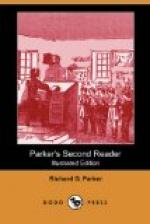Daughter. O, yes, dear mother; and I have often wondered why Alice could not light her lire and the lamp in the same manner, without those matches, which have so offensive a smell.
Mother. It is very hard work, my dear, to obtain fire by rubbing two pieces of wood together; and it would take too long a time to do it. The two pieces of wood would grow warm by a very little rubbing; but in order to make them take fire, they must be rubbed together a great while.
Daughter. But, mother, if it takes so long a time to get fire by rubbing two pieces of wood together, why can Alice set the match on fire so easily by rubbing it once on the sand-paper?
Mother. That is what I am about to explain to you, my dear. Here, take this piece of paper and hold it up to the lamp.
Daughter. It has taken fire, mother.
[Illustration: L]
Mother. Now take this piece of pine wood, and hold that up to the lamp in the same manner, and see whether that will take fire too.
Daughter. Yes, mother, it has taken fire; but I had to hold it up to the lamp much longer than I did the paper.
Mother. Now take this piece of hard wood, and do the same with that.
Daughter. The hard wood takes longer still to catch fire, mother.
Mother. Yes, my child. And now I am going to make the hard wood take fire more quickly than the paper did.
Daughter. Dear mother, how can you do it?
Mother. I am going to show you, my dear. Here is a small phial, which contains something that looks like water. It is spirits of turpentine. I shall dip the point of the piece of hard wood into the phial, and take up a little of the spirits of turpentine. Now, Caroline, touch the point of the hard wood with the turpentine on it to the flame.
Daughter. Why, mother, it caught fire as soon as I touched the flame with it!
Mother. Yes, certainly; and you now see that some things, like the spirits of turpentine and the paper, take fire very readily, and others take fire with more difficulty.
Daughter. Yes, mother; but when Alice drew the match across the sand-paper, there was no flame nor fire to touch it to. How, then, could it take fire?
Mother. Hold this piece of paper up to the blaze of the lamp, my dear, but be careful not to touch the fire or flame of the lamp; only hold it close to the blaze.
Daughter. Why, mother, it has taken fire!
Mother. You see, then, that a thing will sometimes take fire when it does not touch the fire.
Daughter. Yes, mother; but I do not understand where the fire comes from.
Mother. The fire comes from the heat, my dear. Now, you know that heat is produced by rubbing two things together; and that some things, like the spirits of turpentine, take fire very easily, or with very little heat; and others, like the hard wood, require to be heated some time,—or, in other words, require much heat,—to make them take fire, or to burn. Some things require only as much heat to make them take fire as can be obtained by rubbing them together very quickly, like the wood which Robinson Crusoe’s man Friday used.




